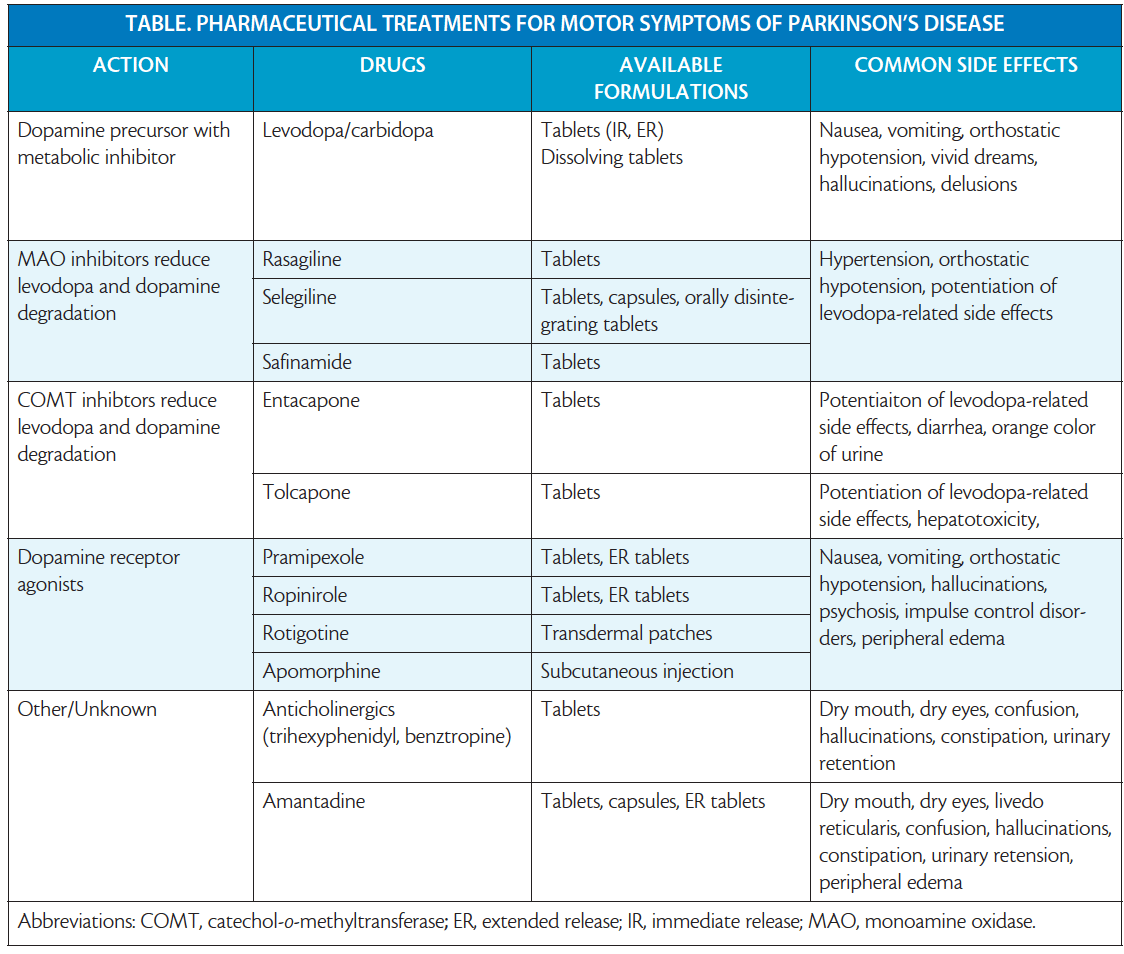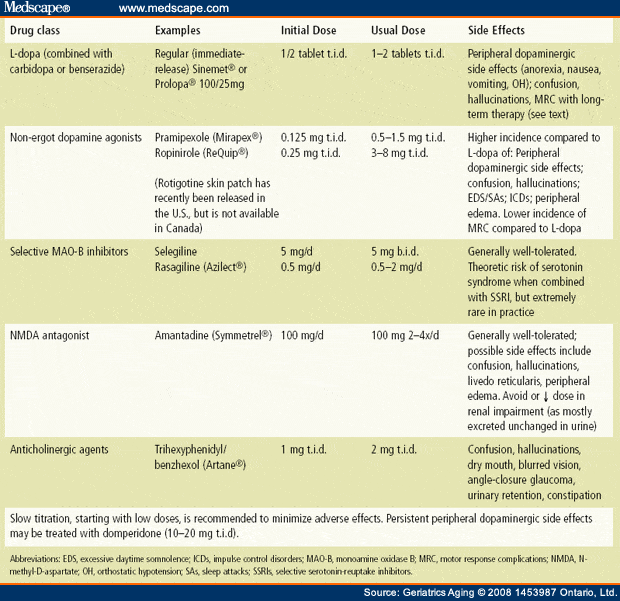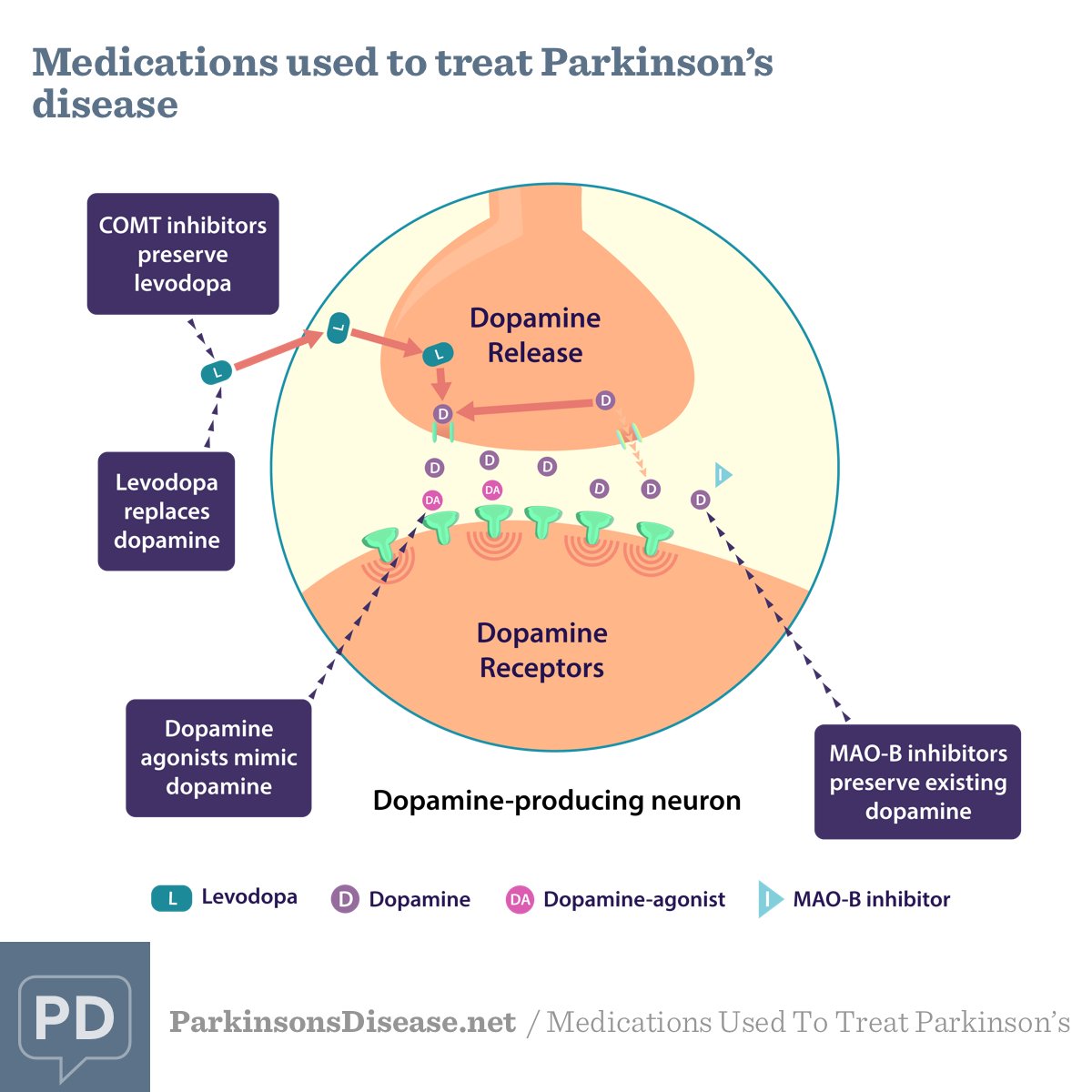What Are The Most Common Medicines Used To Treat Pd
Sinemet®
Levodopa is the most commonly prescribed and most effective medicine for controlling the symptoms of PD, particularly bradykinesia and rigidity.
Levodopa is a chemical found naturally in our brains. When given as a medicine, it is transported to the nerve cells in the brain that produce dopamine. It is then converted into dopamine for the nerve cells to use as a neurotransmitter.
Sinemet is made up of levodopa and another drug called carbidopa. Levodopa enters the brain and is converted to dopamine while carbidopa prevents or lessens many of the side effects of levodopa, such as nausea, vomiting, and occasional heart rhythm disturbances. It is generally recommended that patients take Sinemet on an empty stomach, at least ½ hour before or one hour after meals.
There are two forms of Sinemet: controlled-release or immediate-release Sinemet. Controlled-release Sinemet and immediate-release Sinemet are equally effective in treating the symptoms of PD, but some people prefer the controlled release version. Ask your doctor which approach is best for you.
Dopamine agonists
Dopamine agonists are medicines that activate the dopamine receptor. They mimic or copy the function of dopamine in the brain.
Parlodel®, Requip®, and Mirapex® are all dopamine agonists. These medicines might be taken alone or in combination with Sinemet. Generally, dopamine agonists are prescribed first and levodopa is added if the patients symptoms cannot be controlled sufficiently.
Symmetrel®
Impulsive And Compulsive Behaviours
People who experience impulsive and compulsive behaviours cant resist the temptation to carry out an activity often one that gives immediate reward or pleasure.
Behaviours may involve gambling, becoming a shopaholic, binge eating or focusing on sexual feelings and thoughts. This can have a huge impact on peoples lives including family and friends.
Not everyone who takes Parkinsons medication will experience impulsive and compulsive behaviours, so these side effects should not put you off taking your medication to control your symptoms.
If you have a history of behaving impulsively you should mention this to your GP, specialist or Parkinsons nurse.
Asking your specialist to make changes to your medication regime or adjusting the doses that you take is the easiest way to control impulsive and compulsive behaviours. So, if you or the person you care for is experiencing this side effect, tell your healthcare professional as soon as possible before it creates large problems.
If you are not able to get through to your healthcare professional straight away, you can call our Parkinsons UK helpline on 0808 800 0303.
We have advice that can help you manage impulsive and compulsive behaviours as well as information on what behaviour to look out for.
Types Of Parkinson’s Medication
There is currently no cure for Parkinsons, but medication can usually provide good symptom control for a long time. Meanwhile researchers continue to search for a cure, and research into new and improved medicines continues.
Dopamine is a chemical messenger made in the brain. The symptoms of Parkinsons are largely associated with a decrease in the levels of this chemical, due to the death of the nerve cells that make it.
Unfortunately, taking dopamine as a drug treatment would not help you, because it cannot cross into your brain where it is needed. There are a number of approaches that can be taken to try to compensate for the dopamine deficit and therefore alleviate the symptoms of the condition. Ultimately these will increase the levels of dopamine and help to overcome some of the symptoms of the condition. However, many of the medications may have side effects which should be taken into account when being prescribed.
A wide range of Parkinsons medications is available. These may be taken in many different forms. Your doctor will try to find the medication that is most suitable for you throughout your Parkinsons treatment. What is available will also depend on the country in which you live.
Don’t Miss: Very First Signs Of Parkinson’s
Ask Your Doctor If You Can Change The Time At Which You Take Your Meds
Dont experiment with the timing of your Parkinsons disease drugs yourself, because this can result in a variety of complications. You can, on the other hand, ask your doctor whether it is possible to take your medications at a different time of day. Meds that induce sleepiness may be better taken before bedtime, for instance, while those drugs that have insomnia as a side effect may be better taken earlier in the day. Your doctor will have had more experience in prescribing the medications you take, and will have helpful tips to share.
Contraindicated Drugs For Parkinsons Patients

More than two dozen drugs should not be taken by Parkinsons patients because they alter the brains dopamine system. Always let your neurologist know before you have surgery, so he or she can work with your medical team to keep your Parkinsons in control. View a list of drugs that Parkinsons patients should not take.
You May Like: Parkinson Disease Medications To Avoid
You May Like: Watch For Parkinson’s Tremors
Side Effects Of Medication
All prescribed medication can have potential side effects, including those used to treat Parkinsons.
Many people find their Parkinsons medication works very well when they start taking it, but this may change over time and side effects can develop.
Some things you think are symptoms of Parkinsons may actually be side effects of medication.
Some peoples side effects will have a big impact on their lives and have to be kept under control along with the symptoms.
Impulsive And Compulsive Behavior
Some people taking dopamine agonists may experience problems with impulsive or compulsive behaviours. For example an increased desire to gamble or engage in sexual activity. These behaviours often develop slowly so may not seem to be a problem immediately. It is important for both the person living with Parkinsons and their family to be aware of this side effect. If affected by this side effect, a reduction in dose or stopping the medication will stop the behaviour.
Don’t Miss: Lifestyle Changes For Parkinson’s Disease
Exploring Seven Recently Approved Parkinsons Treatments
Remarkably, in the last five years, seven new medications have been approved for the treatment of the motor symptoms of Parkinsons disease , with two approved in 2020. Thats exciting progress! And while it is great to have so many choices, the various options can be confusing so today I will describe these new medications and their uses.
Withdrawal Syndrome With Levodopa
Research has shown that withdrawal symptoms can happen when someone very suddenly stops taking levodopa, perhaps because they are experiencing impulsive and compulsive behaviour. It can lead to symptoms such as depression, anxiety and pain. Any withdrawal from Parkinsons medications needs to be done gradually, under the supervision of a health professional, to avoid the risk of developing this syndrome.
Recommended Reading: Visual Hallucinations In Parkinsons Disease
Read Also: Parkinson’s End Of Life Signs
How Is Pain Treated In Patients With Parkinson Disease
Pain serves as 1 of the most frequent nonmotor complaints in patients with Parkinson disease , affecting 68% to 95% of patients across all clinical stages. Published in the Journal of Parkinson Disease, researchers highlight that similar to PD, pain is complex and even has different classifications of subtypes within the disease.
While prominent, real-life pain data in PD remains scarce. Researchers sought to provide an overview on pain in PD, including classification, assessment, presentation, and the existing therapy landscape.
As researchers highlighted, todays classifications of pain in PD include musculoskeletal, radicular/neuropathic, dystonia-related, akathic discomfort/pain, and central pain. Notably, the difference in pain directly related to PD and central pain, which is attributed to objective painprocessing and pain-perception disturbance within ascending and descending pathways, was referenced. Most frequently, pain presents as musculoskeletal/nociceptive pain in PD patients, but in nearly half of the PD population, comorbid conditions, such as spine and joint arthrosis, serve as contributors.
When it comes to treating pain in PD, interventions remain a major unmet need as only approximately 50% of those with the disease receive at least some type of pain therapy. In managing pain, researchers recommend that therapy should be optimized to address dopaminergic issues, which has been shown to be effective in 30% of patients with PD.
Reference
What Makes Parkinsons Disease Worse
Stress and depression have been shown to exacerbate symptoms. You should also avoid medications that block dopamine, which includes some headache and gastrointestinal medications. Even if you avoid these, inevitably, Parkinsons disease will progress and time will, unfortunately, bring worsening symptoms.
Also Check: Deep Brain Stimulation Parkinson’s Surgery
What Causes Parkinsons Disease
The most prominent signs and symptoms of Parkinsons disease occur when nerve cells in the basal ganglia, an area of the brain that controls movement, become impaired and/or die. Normally, these nerve cells, or neurons, produce an important brain chemical known as dopamine. When the neurons die or become impaired, they produce less dopamine, which causes the movement problems associated with the disease. Scientists still do not know what causes the neurons to die.
People with Parkinsons disease also lose the nerve endings that produce norepinephrine, the main chemical messenger of the sympathetic nervous system, which controls many functions of the body, such as heart rate and blood pressure. The loss of norepinephrine might help explain some of the non-movement features of Parkinsons, such as fatigue, irregular blood pressure, decreased movement of food through the digestive tract, and sudden drop in blood pressure when a person stands up from a sitting or lying position.
Many brain cells of people with Parkinsons disease contain Lewy bodies, unusual clumps of the protein alpha-synuclein. Scientists are trying to better understand the normal and abnormal functions of alpha-synuclein and its relationship to genetic mutations that impact Parkinsons andLewy body dementia.
Levodopa Or Dopamine Agonists: What Does Research Say

Several studies have looked into the long-term effects of the initial “levodopa vs. dopamine agonist” treatment decision. For instance, one large study showed the following after seven years:
- About 50 out of 100 people had stopped their initial treatment with dopamine agonists because the side effects were too bad or the medication wasn’t effective enough.
- In comparison, at the same stage only 7 out of 100 people had stopped their initial treatment with levodopa.
- 33 out of 100 people who had begun treatment with dopamine agonists had uncontrolled movements.
- In comparison, 36 out of 100 people who began treatment with levodopa had uncontrolled movements.
The vast majority of participants were aged 60 or over.
You May Like: Is Parkinson’s Disease Hereditary
Patients With Pd Psychosis Often Have Comorbid Dementia8
- In a retrospective analysis, more than 50% of patients with PD psychosis had comorbid dementia
*IRR for composite falls and fractures=1.44 95% CI, 1.39-1.49. Falls and fractures were identified by using inpatient and outpatient ICD-9-CM and ICD-10-CM diagnosis codes in any diagnostic position. PD patients without psychosis were identified in the Medicare claims databases and followed from the first PD diagnosis date during the study period . Patients with a subsequent diagnosis of psychosis were included in the PD psychosis group . Patients in both groups were propensity scorematched based on characteristics within blocks of time since cohort entry.A 10-year retrospective analysis of healthcare claims from a large US managed care population identified patients with PD who were enrolled in the health plan as of September 2007. The estimated point prevalence of PD psychosis within this population ranged from 4 to 45 per 1000 PD patients.8
What Side Effects Does The Medication Have
The risk of side effects generally depends on the following:
- which medication is being taken
- the person’s age and whether they have other diseases
- which other medication the person is on
Dopamine agonists are generally less well tolerated than levodopa. They are more likely to cause side effects such as fluid retention , sleepiness, constipation, dizziness, hallucinations and nausea. People who take dopamine agonists are therefore more likely to stop treatment or not take their medication regularly.
The possible side effects of levodopa include nausea, loss of appetite, dizziness, strong urges, and confusion. At high doses it can also lead to movement problems. Levodopa is usually well tolerated when taken in low doses.
Older people in particular can react to both medications with hallucinations and confusion. Parkinson’s medication can also lead to impulsive, obsessive behavior such as a shopping or gambling addiction, an insatiable hunger or sexual desire, or constantly repeating aimless tasks such as putting objects into a certain order.
Don’t Miss: Louie Body Parkinson’s Disease
How Anticholinergics Are Used
These medications are older and are not used very often for Parkinsons today. Sometimes they are prescribed for reducing tremor and muscle stiffness. They can be used on their own, especially in the early stages of your Parkinsons when symptoms are mild, before levodopa is prescribed.
Anticholinergics can also be used with levodopa or a glutamate antagonist. They are taken as tablets or as a liquid.
Looking Out For Side Effects If Youre A Carer
If youre a carer of someone with Parkinsons, medication side effects can be difficult and tiring to cope with.
It may be that the person having side effects such as hallucinations and delusions or impulsive and compulsive behaviour does not realise they are experiencing them.
Its important to seek help from your specialist as soon as you can.
Recommended Reading: Parkinson’s Treatment Crossword Clue
What Are The Other Forms Of Medicines That Can Cause Parkinsons Disease
Some of the other common medicines which can cause Parkinsons disease may include some forms of anti-depressants, anti-nausea drugs, drugs used for the treatment of vertigo, drugs used for epilepsy and anti-arrhythmics. It should be remembered that not all drugs in these classes may cause signs of Parkinsonism. The doctor generally makes the patient aware of the side-effects before prescribing a certain form of drugs. Nevertheless, it is important from the patients part to ask about the side-effects of the prescribed medicines.
Before Taking This Medicine
You should not use Sinemet if you are allergic to carbidopa or levodopa, or if you have:
-
narrow-angle glaucoma.
Do not use Sinemet if you have used an MAO inhibitor in the past 14 days. A dangerous drug interaction could occur. MAO inhibitors include isocarboxazid, linezolid, methylene blue injection, phenelzine, tranylcypromine, and others.
To make sure Sinemet is safe for you, tell your doctor if you have:
-
a stomach or intestinal ulcer
-
open-angle glaucoma or
-
depression, mental illness, or psychosis.
People with Parkinsons disease may have a higher risk of skin cancer . Talk to your doctor about this risk and what skin symptoms to watch for.
Tell your doctor if you are pregnant or breastfeeding.
The disintegrating tablet may contain phenylalanine. Tell your doctor if you have phenylketonuria .
Recommended Reading: Multiple System Atrophy Vs Parkinsons
You May Like: Can Parkinson’s Disease Cause Dementia
Negative Impact Of Severity Of Pain On Mood Social Life And General Activity In Parkinsons Disease
This case control study designed for clinicians and rehabilitation specialists to effectively identify pain from the patients point of view determined that PD patients had significantly higher pain severity scores compared to controls. PD patients with depressive symptoms had significantly higher pain severity and pain interference scores than controls without depressive symptoms. PD patients reported greater scores on Global BPI pain interference and all components of the pain interference subscale. Therefore, PD and depression seem to be correlated with higher perceived pain, severity and interference. A report on this study, by Jose Marques Lopes, PhD., was published in Parkinsons News Today, September 21, 2018.
Keep A Medicine And Symptoms Diary

Keeping a diary can help you to monitor your condition and keep track of your medicines. A diary can be a useful way of letting your doctor know what problems youre experiencing, any changes in your condition from day-to-day or over a period of time, and how well your medicine is controlling your symptoms. It can also help remind you of things you want to discuss during your appointment that you may otherwise forget. You can also use it to record any embarrassing issues that you want help with but find difficult to ask about. Here is some advice on the type of information you might want to keep track of if you have Parkinson’s yourself, or if you are caring for somebody else with Parkinson’s.
You May Like: Boyd Gaines Parkinson’s Disease
Support For People Living With Parkinsons Disease
While the progression of Parkinsons is usually slow, eventually a persons daily routines may be affected. Activities such as working, taking care of a home, and participating in social activities with friends may become challenging. Experiencing these changes can be difficult, but support groups can help people cope. These groups can provide information, advice, and connections to resources for those living with Parkinsons disease, their families, and caregivers. The organizations listed below can help people find local support groups and other resources in their communities.
This Is Something To Consider When Choosing To Take An Anti
This isnt the first study to uncover this harsh reality. Anti-depressants have long been linked to Parkinsons Disease, with some studies indicating that taking certain anti-depressants can increase the risk of developing this condition. However, other anti-depressants may be a better choice for patients struggling with depression and anxiety, says Sarah Watson, LPC, a psychologist and life coach.
Its important to note that more studies and evidence need to be found to validate these claims, but it is still something to consider if you are taking these medications. While further research needs to be done to confirm these findings, this potential risk is enough for many patients and physicians to consider other options for treating depression. Also, other antidepressants be on the market that do not carry this risk and are worth exploring,says physician, Kellie K. Middleton, MD/MPH.
Recommended Reading: Can Thyroid Problems Mimic Parkinsons
Recommended Reading: Lumbar Spine Surgery In Patients With Parkinson Disease